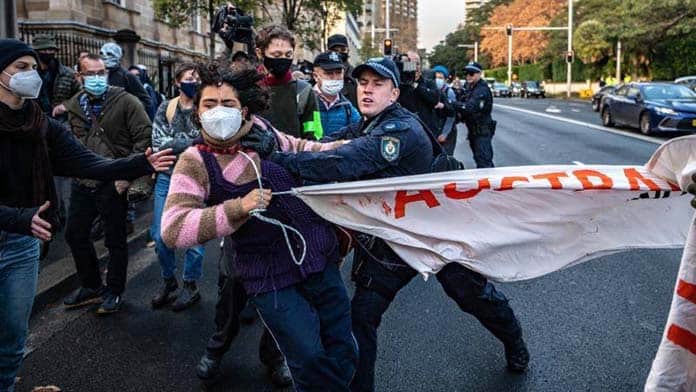A police crackdown on climate activists linked to Blockade Australia has seen over 35 people arrested in a fortnight. A number of them are facing serious charges under draconian new anti-protest laws in NSW.
Anyone who supports action on climate change needs to stand in solidarity with those facing charges and police repression.
There has already been a widespread outcry against the crackdown. A solidarity protest ahead of a major court hearing in July drew support from Amnesty International, the Human Rights Law Centre, the Maritime Union of Australia and numerous climate action groups.
Under the new laws protesters can face up to two years in jail or a $22,000 fine for blocking major roads or infrastructure.
In the lead up to a week of action at the end of June, police covertly surveilled and eventually raided a Blockade Australia camp with 100 armed officers that included a riot squad, dog squad and helicopters.
Police smashed car windows and detained around 40 activists, with eight people charged with offences including affray, assaulting a police officer and conspiracy to obstruct a road. Two people were held for almost a month in isolation in a maximum security prison before being released under strict bail conditions.
As Alice Dury, Legal Director of the Human Rights Law Centre, put it, “Sending in 100 armed police officers to threaten and intimidate people planning a peaceful protest is alarming and disproportionate.”
Despite the police raid, Blockade Australia still went ahead with their week of action, attempting to disrupt the Sydney CBD in order to demand action on climate change.
This led to numerous other arrests. A number of activists were even surrounded and arrested while having a picnic in a suburban park the day after a protest.
Those arrested were given strict bail conditions restricting them from entering the CBD, non-association orders with a list of over 20 people, a ban on using encrypted messaging apps like Signal, while those from outside NSW were given between 24 and 72 hours to leave the state.
Real climate criminals
The real criminals are not protesters but the fossil fuel companies and governments destroying the planet. The NSW government is backing Santos’ destructive coal seam gas project in the Pilliga Forest near Narrabri, and has done nothing to stop Whitehaven’s effort to expand its coal mining operation there, which would make it the most polluting thermal coal project in Australia.
Despite decades of warnings governments are still not taking the action needed to avert climate catastrophe. Disruptive protests are vital to building the pressure needed to force action.
Unionists, students, environmental groups and other activists all need to unite to defend the right to protest and support those charged under NSW’s anti-protest laws.
But direct action by small groups or individuals is not enough on its own to win climate action.
Disruptive action is essential, but it needs to be on a large scale, and part of a wider movement capable of mobilising serious numbers of people. Civil disobedience actions in the past such as the efforts to help refugees escape detention at Woomera in 2002 or the blockade at the Jabiluka uranium mine in 1999 have helped raised the political stakes and generated pressure for change, as part of broader movements backed by mass demonstrations and wider support.
But the most disruptive and powerful form of direct action is workers’ strike action, which has the power to raise the cost to the ruling class enormously by halting their profits. Workers have taken action in the past to oppose the Vietnam War, uranium mining, and to save parkland through construction Green Bans.
Workers can also be won to taking direct action opposing gas and fossil fuel projects, like Santos’ plan to exploit the Pilliga.
We need to build a climate movement that actively involves workers through the trade union movement and by agitating for strike action that includes demands on climate change. This means supporting a just transition and opportunities for fossil fuel workers to have stable, unionised jobs in the renewable energy sector.
In 2019 when school students went on strike, their actions were endorsed by many unions. Striking workers from Port Botany in Sydney joined one of the Climate Strike rallies.
We can’t allow the police repression against Blockade Australia to intimidate activists out of organising for climate action. Further solidarity actions and support will be needed when Blockade Australia activists are back in court, demanding police drop the charges and to call for an end to the criminalisation of protest.
By Niko Chlopicki






